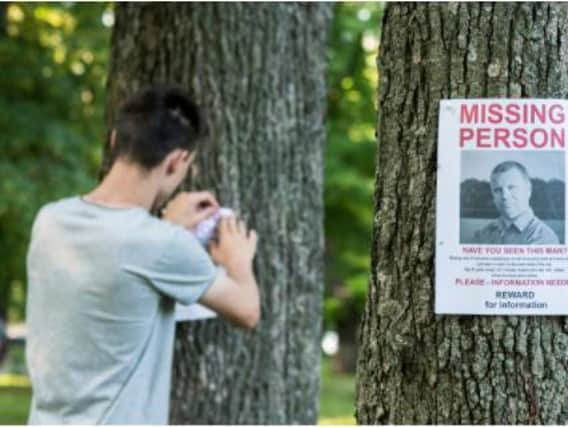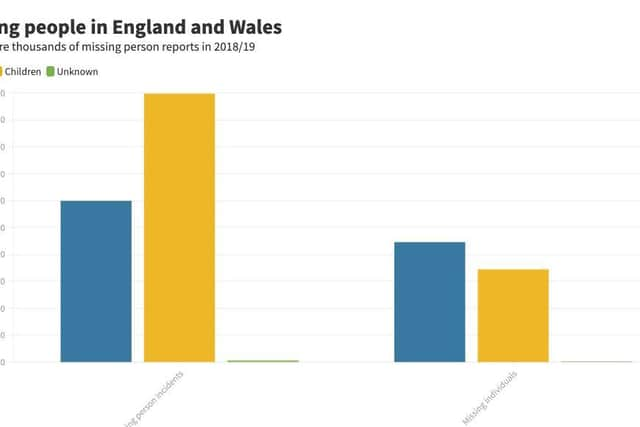More than 13,000 people went missing in the Thames Valley during 2018/19


4, 281 of the people missing are adults, while a worrying 2,991 of these are children.
Across the Thames Valley, there were more than 13,000 incidents of people disappearing.
Advertisement
Hide AdAdvertisement
Hide AdPolice forces across the UK reported hundreds of thousands of missing person incidents according to the latest figures released from the National Crime Agency.


Despite the alarming figures, thousands of cases still remain unsolved, with the families of missing people and charities believing more can be done to tackle the problem.
Missing People charity said there needs to be more of a multi-agency response to prevent vulnerable people from further missing episodes.
A National Register of Missing Persons is currently being developed by the Home Office to improve understanding of missing incidents and to help data sharing across police forces.
Advertisement
Hide AdAdvertisement
Hide Ad58.9% of all incidents of people going missing across the Thames Valley involve Children.
Joe Apps, Head of the UK Missing Persons Unit at the National Crime Agency, said:
“There are a vast array of reasons for people to go missing, and it can be prompted by almost anything in someone’s life. This ranges from a personal decision to escape family or financial worries, to being a victim of county lines gangs or child sexual abuse and exploitation.
“Around 80% of missing people were found in less than 24 hours. Children are more likely to be return of their own accord or be found by parents, families and carers than by the police. In contrast, adults are less likely to return on their own and more are found by the police than by their community. Elderly people living with dementia who go missing present the highest risk.
Advertisement
Hide AdAdvertisement
Hide Ad“We continue to work with partners in law enforcement and the voluntary sector to identify risk, safeguard vulnerable people and support families and friends”
How many people went missing?
The latest figures published by the National Crime Agency’s (NCA) Missing Persons Unit and analysed by the JPIMedia Data Unit, shows hundreds of thousands of missing person incidents were reported to police forces in 2018/19.
In England and Wales there were over 320,000 missing person incidents and over 158,000 individuals reported missing.
In Northern Ireland there were over 10,000 missing person incidents reported and over 5,000 individuals reported missing
Advertisement
Hide AdAdvertisement
Hide AdIn Scotland over 21,000 missing person incidents were reported and over 11,000 individuals were reported missing.
Although the figures show hundreds of thousands of cases, changes in recording processes over the years has meant concrete comparisons between the yearly figures could not be made.
However, the general trend of the nation-wide figures for England and Wales shows a five year rise in the number of missing person incidents.
The NCA confirmed to the Data Unit that the number of missing people has been increasing since they started collecting and publishing figures but pointed out that the year-on-year increases started to level off in the 2017-2018 year.
Advertisement
Hide AdAdvertisement
Hide AdBecause of insufficient data a similar analysis could not be carried out for Northern Ireland and Scotland.
Who is still missing?
Although the majority of missing people are found within 24 hours, there are 4,638 long term missing people whose fate is largely unknown.
There’s very limited public information about who these people are. This is for a variety of reasons including privacy and safety concerns.
A National Register of Missing Persons (NRMP) is currently in development, overseen by the Home Office and expected to be delivered in 2023.
Advertisement
Hide AdAdvertisement
Hide AdA spokesperson for the Home Office said the NRMP will “significantly improve” their understanding of missing person incidents.
The Home Office said it will allow all forces in the UK to manually record missing and associated found incidents, and to access data about missing people from other force areas.
The spokesperson added: “It is vital that the police have access to fast and accurate data and intelligence that can be shared between forces.”
Jane Hunter, Senior Research and Impact Manager at Missing People charity said, “Whilst police rightly take the lead on investigations into disappearances, we’d like to see the return of a missing person as a moment that activates a multi-agency response, to identify which support measures should be put in place to safeguard and prevent further missing episodes.”
Advertisement
Hide AdAdvertisement
Hide AdJoe Apps, Head of the UK Missing Persons Unit at the National Crime Agency, added, “We continue to work with partners in law enforcement and the voluntary sector to identify risk, safeguard vulnerable people and support families and friends.”
Why do people go missing?
From abduction to suicide, there are many complex reasons as to why a person goes missing.
Analysis of the NCA data found mental health was the leading cause of 18-59 year olds going missing, while dementia (including Alzheimers) was the leading cause of over 60s going missing. Relationships were the most common cause for children going missing.
The data also revealed more reported incidents involved men and boys than women and girls.
Advertisement
Hide AdAdvertisement
Hide Ad“Behind these figures are individual people, who may be experiencing mental health crises, problems where they live, exploitation, domestic violence, or a range of other issues,” explained Ms Hunter.
“And we must not forget those left behind, desperately searching for answers to their loved one’s whereabouts. While figures show that most people will thankfully return within a week, going missing should be seen as a warning sign, that something is seriously wrong and that support must be available upon their return.”
Ms Hunter added, “Having a loved one go missing can be traumatic, no matter how long they are away. Families may experience ‘ambiguous loss’, a very difficult type of loss where the outcome is unknown and closure isn’t possible. Missing People provides 24/7 support for families struggling with a disappearance.”
For information and support contact Missing People at www.missingpeople.org.uk